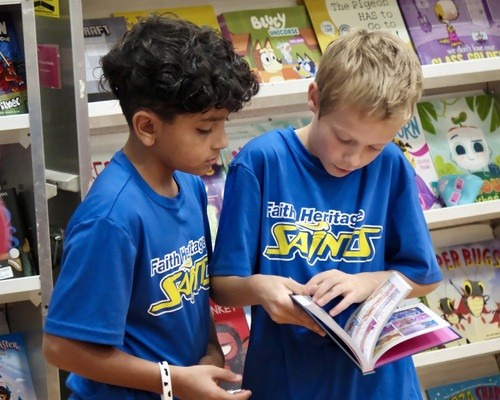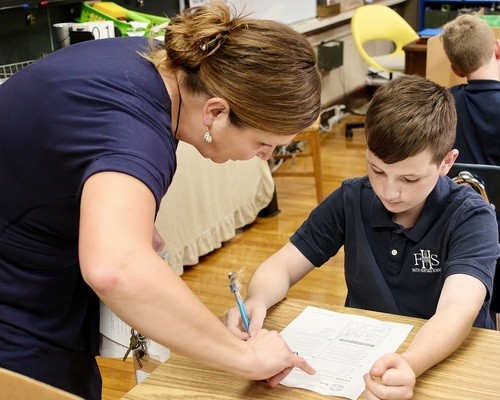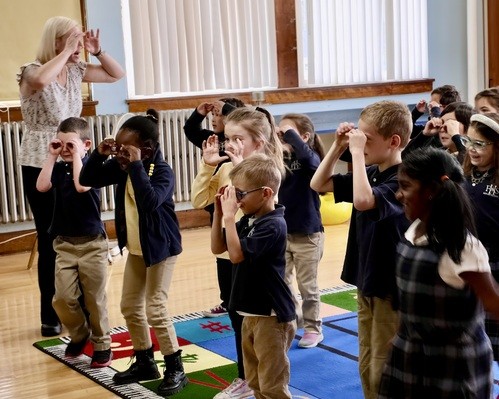Our elementary program is designed to help children grow academically & spiritually.
Along with the ABCs… at Faith Heritage School, children are taught that God is their Creator and that He has a purpose for them!
A Faith Heritage education begins on the firm foundation of God’s Word. Each and every subject is taught from a Biblical perspective, so students can grow in God’s wisdom and His Truth. Our program includes daily lessons in Bible, reading, phonics, spelling, mathematics, science, social studies, language arts, and penmanship. Physical education, library, computer, art, music, choir, and chapel round out the elementary program.



Curriculum by Area
Bible
Bible lessons are taught daily in all elementary grades. These lessons focus on a number of Bible stories, and Bible characters, integrating Godly character traits into our lessons. Weekly Bible memorization takes place at each grade level.
Each week, chapels provide students an opportunity to worship together and grow in their relationships with Christ. Once each year, a special Spiritual Emphasis Week challenges the children to grow more in the Lord and His Word in a personal, meaningful way.
Each week, chapels provide students an opportunity to worship together and grow in their relationships with Christ. Once each year, a special Spiritual Emphasis Week challenges the children to grow more in the Lord and His Word in a personal, meaningful way.
Learning to Read
Our FHS Early Elementary program focuses on carefully sequenced skills. Students are encouraged to build skills in print awareness, alphabet, and phonemic awareness, blending sounds in decoding words, vocabulary building, and fluency. This begins in Kindergarten with the introduction of individual sounds and letters, then develops from grade level to grade level. Each year, Students grow in their ability to understand letter/sound relationships, to understand words and text, to read orally with speed, accuracy, and expression, and finally in the ability to understand a wide variety of texts.
Reading to Learn
The ability to comprehend a text and connect ideas is essential to long-term success in school and life. Meaningful, character-building stories are used to expose students to comprehension and critical thinking skills. Using visual tools, our students learn to re-tell stories, discuss characters, sequence events, make predictions, draw conclusions, and apply other comprehension skills/strategies. Leveled books and a variety of teaching strategies help to provide for the needs of a wide variety of readers.
Writing
Writing skills are developed alongside reading skills, emphasizing the importance of communicating clearly through the printed word. Students learn to write grammatically correct sentences and stories using correct punctuation, capitalization, nouns/verbs, plurals, etc. This begins in Kindergarten but is refined and mastered in grades 1 and 2. In addition, grammar skills are connected to other learning through writing, listening, and speaking opportunities.
Science
Students in all grades engage in interactive Science lessons as they explore our world and how God created it. The human body, the seasons, plants and animals, landforms and bodies of water, weather, the Solar System, and other grade-appropriate concepts are included. Hands-on experiments bring these lessons to life. All Science concepts are taught acknowledging God as Creator, Designer, and Sustainer.
Social Studies
In Social Studies, students learn about how our country was formed, discussing our nation’s leaders, famous Americans, symbols of our country, community helpers, and more. Teachers emphasize good citizenship, stewardship, and responsibility as a member of our local community as well as of our nation as a whole. Students begin to place themselves in a larger story and impact on others.
Math
Students learn a wide variety of math concepts and skills through the use of a structured, hands-on math program. In the early grades, manipulatives are used as new concepts are introduced, followed by guided class practice and homework. Students gain a working knowledge of the calendar, telling time, counting money, graphing, addition and subtraction, word problems, place value, measurement, geometric shapes and solids, identifying patterns, and other math concepts with increasing difficulty at each grade level.
The Big Picture
Lay a Firm Foundation
With a firm foundation in the basic skills and an excitement for learning, our elementary students are prepared to succeed as they graduate to High School.
What's next?
Students progress to Middle and High School courses with an increasing focus on college preparedness.
